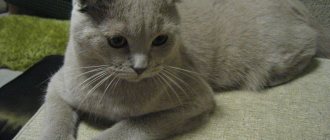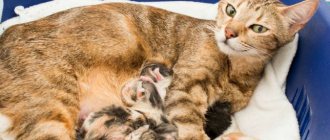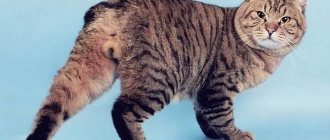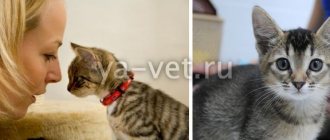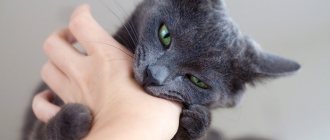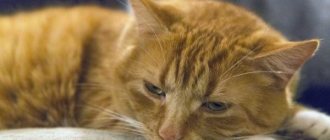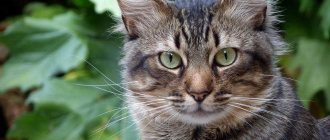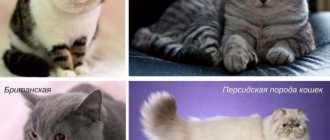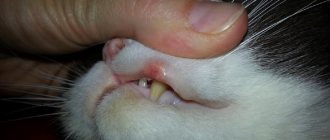What is it and why are paraanal glands needed in cats?
Before further describing the pathology, it is first necessary to talk about what it is and why the paraanal glands are needed in cats.
“Perianal” are the glands located on either side of the anus. Their tissues produce a brownish, oily secretion that has an extremely unpleasant odor, as well as properties that are very important for a cat:
- The oily consistency of the liquid is provided by nature for a reason. The secretion of the glands is the natural lubrication of formed feces coming out of the rectum. If the sinuses do not secrete a normal amount of this lubricant, the cat will almost certainly have ongoing problems with constipation.
- The secretion contains many volatile and odorous substances. Again, they are kept there for a reason. With their help, a cat can mark its territory from encroachments of relatives and other animals.
Reasons for violation
Blockage of the paraanal glands in cats most often develops in domestic young males who lead a sedentary lifestyle. Representatives of long-haired breeds are more at risk of developing this pathology. The causes of the disease may be the following factors:
- poor nutrition, which leads to disruption of the intestines and provokes constipation or diarrhea;
- the abundance of cartilage and bones in the animal’s diet (chicken, fish, etc.), which can also interfere with the act of defecation;
- metabolic disorders causing obesity;
- violation of the integrity of the tissues of the anus as a result of injury and subsequent improper treatment of the wound;
- intestinal parasites;
- pregnancy.
When the outflow of secretions is disrupted, excess fluid accumulates in the anal sacs. As a result, they increase in size and begin to cause severe discomfort to the cat.
The main causes of inflammation
Let's consider the most typical and often encountered in practice causes of inflammation of the paraanal glands:
- Incorrect nutrition. This disease is often encountered by cats whose owners use economy class dry food to feed them. Contrary to popular belief, neutered animals have a much lower risk of sinus inflammation than when compared to “normal” animals.
- Feeding bones (especially chicken and fish). Their sharp fragments perfectly injure the delicate walls of the intestines, can cause blockages and perforations of the intestines, and can also cause inflammation of the rectal glands. Feeding cats with such “treats” is strictly contraindicated!
- Obesity.
- Problems with the kidneys and liver (up to urolithiasis/cholelithiasis). In short, such a pet must be brought for a full veterinary examination.
- Helminthic infestations. In some species, females lay eggs directly on the skin around the anus. Because of this, the skin is itchy, the cat constantly licks and gnaws it, introducing infection into the sinuses.
- Constipation of various etiologies. We wrote that inflammation of the sinuses often leads to constipation, but constipation itself can be the cause of this pathology. If an animal does not poop for a long time, the secretion accumulates inside the organ, tears its tissues and causes an inflammatory reaction.
- Prolonged diarrhea (especially caused by infectious diseases). With prolonged diarrhea, the skin around the anus becomes very inflamed and macerates (softens), which several times increases the risk of infection of the tissues of the peri-rectal sinuses.
- Systemic infectious diseases. We must not forget that the infectious agent can easily enter any organs and tissues of the animal’s body.
Symptoms of the disease
A cat whose anal glands are inflamed behaves accordingly:
- licks the anal area to relieve itching and irritation;
- presses the glandular area against a hard surface to provide compression.
Many cats maintain patency of the canals. The secretion released from the glands has a different consistency and color depending on the stage of the disease:
- in the initial stage of pathology with aseptic inflammation, the secretion is abundant, liquid, grayish in color with cheesy inclusions;
- at the second stage of the inflammatory process, a pasty dark brown exudate is noted;
- with paraadenitis, the discharge is of a thick consistency with a color ranging from dark gray to black. The color of exudate from the right and left glands may be different.
Licking leads to hair loss in the perianal area. In addition, the following symptoms of pathology may be observed:
- restless behavior of the animal;
- itching not only in the anus, but also in the skin of the back of the body;
- pain when touching the glands. The animal behaves aggressively - bites, scratches to avoid inspection;
- there may be an increase in body temperature;
- disturbance of the act of defecation due to an increase in the size of the glands and pain;
- decreased appetite;
- swelling and redness in the projection of the glands;
- upon palpation, compaction of the sinuses and the area around the anus is felt.
The condition of the animal's coat deteriorates. The coat becomes dull, brittle, flecked with dandruff and increased oiliness. Hair loss is not only in the perianal area. Signs of alopecia are visible on the rump, the inner surface of the hind legs and at the base of the tail.
If the glands are not freed from the accumulated secretion, the inflammation may be accompanied by an abscess, the rupture of which threatens to contaminate the pet’s blood. Exudate is an excellent breeding ground for the proliferation of pathogenic microorganisms. Their waste products and substances from the contents of the glands are absorbed into the circulatory system and poison the body. Reducing local and general immunity.
Cats with chronic paraanal adenitis develop not only skin lesions, but also diseases of the eyes and ears. As the disease progresses and intoxication spreads, cats lose body weight, which can lead to the death of the animal.
Symptoms of inflammation of the paraanal glands
As the disease progresses, the following symptoms of inflammation of the paraanal glands develop:
- The cat constantly “rides” on the floor on his butt. In this case, the animal may meow nervously and show other signs of discomfort.
- Some cats procrastinate and chew the tip of their tail. Subsequently, this bad habit may remain even after treatment.
- The pet’s desire to constantly lick its “loin . The fur around the anus is always wet and sticky with saliva. Due to favorable conditions (moisture and warmth), the disease begins to progress even faster. If moistened and “gnawed” areas are infested with additional microflora, severe purulent dermatitis near the anus additionally develops.
- Severe itching in other parts of the body.
- In advanced cases, a large abscess appears under the cat's tail , due to which the animal begins to experience difficulty defecating. The process becomes extremely painful, the pet meows hoarsely and strained. Also in these cases, constipation often develops.
- Strong pain. The cat constantly meows, becomes nervous and very restless, refuses food and loses weight.
- When the abscess opens , an extremely unpleasant odor appears from the animal (pus mixed with gland secretions comes out).
- If you lightly press on the anal area (it is advisable to do this using a damp cloth), then in some cases their secretion, mixed with inflammatory exudate, begins to ooze from the swollen glands.
How to determine paraanal gland disease in a cat
If your cat suddenly begins to show anxiety and his behavior has become atypical and corresponds to more than two of the described signs, then we recommend checking the state of the body’s functioning. The main symptoms of inflammation of the anal glands can be considered :
- Increased attention of the pet to the cleanliness of the anus:
- Constantly pressed tail to the area of selection;
- Perceptible unpleasant odor from the pet;
- Softness of stool upon exit;
- Obesity of a pet;
- After pressure is applied to the area of the glands, a dirty-colored discharge with a pungent odor appears;
- The animal often makes strange movements, as if crawling on the floor, sofa or carpets;
- Upon visual examination, many formations are visible around the anal area, sometimes accompanied by slight redness;
- The disease can be inherited due to genetic predisposition.
© shutterstock
Treatment regimen at home
Experienced breeders often use a standard, typical treatment regimen at home:
- It is necessary to properly cut and shave the hair around the anus. This approach will facilitate treatment procedures and significantly reduce the likelihood of developing severe inflammation in the future.
- Wash away dried exudate and fecal residues (if necessary) daily using a cotton swab soaked in sterile chlorhexidine or saline.
- Rectal suppositories (suppositories) are used, which help stop the inflammatory process and relieve constant itching.
- Antibiotic therapy is prescribed in the form of injections or tablets, or the veterinarian prescribes other antimicrobial drugs.
- Antifungal agents (usually injectable form).
- If the pet is in pain during defecation, sedatives and painkillers are prescribed.
If therapy does not produce any visible positive results for 2 weeks or more, castration/sterilization is recommended. When the level of sex hormones in the blood drops, inflammation subsides very quickly.
Self-cleansing
If you can’t get to a doctor, you can cleanse the glands at home.
Before you begin, you should put on old clothes or a protective robe. Glasses will also come in handy. It is better to carry out cleansing in the bathroom, since during manipulations an unpleasant-smelling liquid can splash in all directions.
First way
An assistant is needed who can secure the animal with a diaper or towel. The pet must be wrapped in fabric so that only the tail remains outside.
Then you need to squeeze the anus with your thumb and forefinger, helping with a napkin. Of course, you should wear gloves on your hands. Press on the glands located at 5 and 8 o'clock from the anus until the fluid comes out.
After cleaning, administer an anti-inflammatory suppository rectally. If necessary, cleaning is repeated after a certain period of time.
Second way
The above method is only suitable when the glands are not very enlarged. If the secretion has already thickened, you have to use a more complex and painful cleansing option.
It is necessary to wear protective clothing, gloves, and secure the pet. After this, lubricate your finger with Vaseline and insert it into the anus. From the inside, feel the nodules on the sides of the anus. Squeeze each of them alternately with your fingers. Squeeze out the secretion until the gland is empty.
Third way
Of course, not every owner is ready for such feats. That is why inflammation of the paraanal glands in cats, a photo of which will add to the determination to treat the animal, can be tried to be eliminated in another way. It is worth remembering that it can only be effective in the initial stages of the disease.
To do this, you need to lubricate the anus and nearby tissues with an ointment containing an anti-inflammatory agent (for example, Syntomycin). Be sure to put a collar on the animal to prevent it from licking the medicine. Put a candle with ichthyol at night. To prevent the animal from running straight to the toilet, it is necessary to hold the anus for a while, fixing the candle.
Drugs used
Below we describe the most standard drugs used, which give a good effect in the treatment of inflammation of the rectal sinuses, and at the same time have a fairly attractive cost.
Ointments
Veterinarians prefer to use the following ointments for these purposes:
- Levomycetin ointment. Has a good antibacterial and anti-inflammatory effect.
- Ichthyol. Significantly increases the rate of regeneration and at the same time inhibits the development of pathogenic microflora. In some cases, pure ichthyol is used. It has the same properties, but in his case they are much stronger. Ichthyol must be applied in a thin layer, since in concentrated form it can cause chemical burns.
- Tetracycline ointment 3%. Use exactly 3% concentration, since the 1% ophthalmic version does not give such an effect. It is a good antibacterial agent.
- Vishnevsky's balsamic liniment. A product with a “contradictory” smell, but this ointment has a simply phenomenal anti-inflammatory and regenerating effect.
- Synthomycin liniment. A simple and cheap anti-inflammatory agent.
Antibiotics
Since inflammation of the perirectal sinuses is a rather severe pathological process, antibiotics should be used to stop it quite strong:
- The entire group of cephalosporins (Ceftriaxone, for example). These drugs are highly effective and at the same time quite safe for the cat itself.
- If things are really bad, but the owner refuses to castrate the pet for some reason, it is permissible to use drugs from the tetracycline group (doxycycline). But a cat should be treated with them with extreme caution, since these medications have a very bad effect on the animal’s liver and kidneys.
Rectal suppositories
The following rectal suppositories give a good effect:
- Ichthyols.
- Suppositories with furatsilin.
- Their combination with novocaine suppositories. In this case, both inflammation and pain reaction are relieved at the same time.
Attention! When treating cats, the entire suppository is not administered! They must be cut lengthwise into two parts, and each half must be additionally divided into two more parts (also lengthwise).
In what cases is it necessary to contact a veterinarian?
Sometimes the cat needs to be taken to the clinic immediately, without waiting until the pet becomes really ill. So, in what cases will you need to contact a veterinarian:
- Complete refusal of food and even water. The younger or older the animal, the sooner you need to take it to the clinic.
- Severe pain reaction. The cat cannot poop normally, moans and meows hoarsely. If these same signs are observed regardless of the pet’s desire to relieve itself, things are even worse.
- A sudden and sharp increase in general body temperature, intermittent fever, which greatly exhausts the cat.
- Copious discharge of pus from swollen abscesses under the tail. If you “endure”, then in such cases the cat can easily die from purulent peritonitis or sepsis.
Surgical methods of treatment
In recent years, veterinarians are increasingly promoting surgical methods for treating inflammation of the rectal sinuses. And this is far from accidental: practice shows that animals that have at least once suffered from inflammation of the glands will definitely have relapses, with a 100% probability. In fact, only removing the “root of trouble” will make your pet healthier. Currently, there are two therapeutic methods:
- Simple surgical excision of inflamed sinuses. The operation is very simple and quick and is performed under local anesthesia. An incision is made in the skin, the inflamed sinus is removed and cut off (there are nuances, but this is approximately what happens). The stump is sutured and disinfected. Already on the second day the animal can lead a normal life.
- A less common technique is to cauterize the inflamed glands with liquid nitrogen. After this, the inflamed tissues atrophy and subsequently the animal is no longer bothered.
In addition, surgical treatment methods include castration/sterilization. We have already mentioned above that when the gonads are removed, the intensity of inflammation of the sinuses quickly decreases.
Prices for cleaning the anal glands
| Name of veterinary services | Unit | Price, rub |
| ⭐ Nail trimming | 1 animal | 300 |
| ⭐ Beak trimming | 1 animal | 300 |
| ⭐ Cleaning the anal glands | 1 animal | 300 |
| Hygienic cat grooming (with removal of mats) | 1 animal | 1800 |
| Sanitary animal grooming: | ||
| – small animals (up to 5 kg) | 1 animal | 1500 |
| – medium animals (over 5 kg to 15 kg) | 1 animal | 2500 |
| - large animals | 1 animal | 4000 |
| Sanitary washing of animals: | ||
| – small animals (up to 5 kg) | 1 animal | 500 |
| – medium animals (over 5 kg to 15 kg) | 1 animal | 3000 |
| - large animals | 1 animal | 5000 |
CLINIC REGISTRATION
HOME CALL
How does the procedure work?
If the blockage does not lead to complications, the procedure for cleaning the glands consists of mechanically squeezing out excess secretion through the anus using sterile napkins.
In case of severe pain, a minimum 7-day course of antimicrobial therapy (antibiotic injections with novocaine) is prescribed. If there is severe inflammation, the glands are washed with an antiseptic solution. In some cases, an opening and sanitation of a purulent wound is performed.
If the pathology becomes chronic and you have to clean the anal glands too often, your doctor may recommend surgical removal.
The Bio-Vet veterinary clinic employs qualified veterinarians of all specializations who have extensive practical experience and sincerely love animals. With us, your beloved pet will always be healthy and happy! The main thing is to consult a doctor on time. The clinic's branches are located in all districts of Moscow, in Reutov and Lyubertsy.
Treatment of inflammation in kittens
As a rule, the treatment of inflammation in kittens is not particularly different from the treatment of adult cats, with the exception of a few points:
- Rectal suppositories for babies must be cut into even smaller pieces.
- Since strong antibiotics are extremely contraindicated in the treatment of young animals, in severe cases they immediately resort to surgical excision of the sinuses.
- In addition, if the paraanal glands in kittens become inflamed, veterinarians strongly recommend castrating/sterilizing your pet immediately. If the pet is potentially promising from a breeding point of view, the glands themselves are surgically removed.
Complications of inflammation
If no measures are taken, pathogenic bacteria begin to accumulate in the affected area and actively multiply. As a result, the walls of the paraanal gland rupture and an abscess develops in the cat. This is a very serious situation that significantly worsens the pet's condition.
Abscess of the paraanal glands in cats leads to an increase in temperature, the animal refuses to eat and drink, and becomes lethargic. An abscess is a dangerous condition that complicates treatment and may require surgical intervention. Advanced inflammation later becomes chronic and cannot be completely cured.
Important! Pathological bacteria can penetrate from a purulent wound into the blood, causing infection of the entire body, which leads to death.
Consequences and possible complications
Often the consequences and possible complications of inflammation of the rectal sinuses are extremely serious:
- Often the animal will suffer from constipation problems for the rest of its life.
- A severe decrease in immunity and constant irritation of the anal area is fraught with the development of fungal or secondary bacterial infections.
- In advanced cases, the pet may die from sepsis.
- If an abscess formed at the site of the inflamed gland opens inside the body, the cat is almost 100% likely to die from peritonitis.
Diet and feeding of a cat
Since an important predisposing factor in the development of inflammation of the rectal glands is poor nutrition, a well-chosen diet and feeding diet for the cat plays a huge role in preventing pathology. In addition, high-quality nutrition is the key to the recovery of an already ill pet. Experienced breeders advise adhering to the following rules:
- In the first 3 days of treatment (and especially in the case of surgery), the cat is fed boiled rice, to which rich chicken broth and meat puree from baby food are added. This recommendation is due to the fact that at first the pet should not poop a lot. Rice has a strengthening effect and inhibits peristalsis.
- Prevention of constipation is the most important condition for preventing inflammation itself. For a cat's intestines to function normally, the food must contain some fiber. If “natural” food or food of questionable quality is used, give the cat a teaspoon of pumpkin puree three times a week.
- The risk of sinus inflammation increases several times when using cheap dry food. It is not recommended to feed pets at all, and during treatment and in the postoperative period it is generally prohibited.
- To prevent dehydration and constipation, the cat is provided with clean drinking water in unlimited quantities.
Prevention
Inflammation of the anal glands can be avoided by following simple rules:
- The cat must lead an active lifestyle; if the animal itself is prone to laziness, the owner will have to organize games and races;
- Proper nutrition is necessary, the absence of bones and cartilage in the diet;
- To prevent constipation, the cat’s menu should include a balanced representation of proteins, fats and carbohydrates, and do not forget about the need for fiber (plant fiber);
- Avoid obesity;
- Monitor the cleanliness of the preanal area, treat the anus and glands with a weak solution of potassium permanganate or Miramistin once a month;
- Give your cat antihistamines periodically;
- Monitor the general state of the immune system - add vitamins and special herbs to your pet’s diet.
It is much easier to follow these rules than to carry out treatment later. For prevention, attentive owners bring the cat to the veterinary clinic for a preventive examination once a year.
Prevention of inflammation
In general, preventing inflammation is quite simple:
- The cat is provided with a complete, balanced diet.
- Do not use low-quality, cheap economy-class food for feeding.
- If signs of obesity appear, the pet is immediately put on a diet.
- If possible, take the cat for a walk from time to time. In addition, you need to play with your pet regularly. Physical activity increases muscle tone and prevents the development of obesity.
Therapeutic techniques
If your cat becomes dehydrated from chronic diarrhea, she will need to be hospitalized for intravenous rehydration. When the inflammation is particularly severe, the animal must be put on a starvation diet for 24-48 hours, since the rectum needs time to restore the epithelial layer. Meanwhile, if chronic inflammation and scar tissue have formed in the colon, such simple techniques will no longer help. A surgical operation will be required, during which the affected areas of the organ will be cut out. It should be noted that with proctitis of fungal etiology, surgery is most often required, since pathogenic fungi greatly destroy the tissue of the affected organ.
Cleaning a cat's anal glands
Here's how to clean a cat's anal glands:
- The animal is seated in a bath or basin of suitable size.
- It is necessary to lift the cat with your left hand by the tail so as to lift it off the ground by about 10 cm.
- Putting a surgical glove on your right hand, insert your index finger, previously lubricated with Vaseline, into the anus.
- Having felt the inflamed sinus, it is fixed between the index and thumb (outside) fingers, after which, gently pressing, the secretion is squeezed out.
- Since the secreted liquid is extremely smelly, we strongly recommend that you immediately wash it off with running water.
Treatment
If the disease is detected in the early stages, then therapy is not particularly difficult.
The treatment is based on mechanical cleaning of the glands. The pathological fluid is squeezed out manually, then an antibacterial ointment is applied to the affected area or a special suppository is inserted into the anus. In case of severe inflammation, the doctor rinses the gland cavity with medications and then injects an antibiotic into it.
Then it is necessary to carry out preventive cleaning of the glands to avoid relapse. You can bring the cat to the clinic or do this procedure yourself. The frequency of such manipulations varies from person to person; it can be a couple of times a month or a couple of times a year.
For purulent inflammation, the doctor performs surgical treatment. The cavity is opened, treated with antibacterial solutions and drained, if necessary.
To protect the licking of medicinal substances and licking of the wound, a bandage is applied or a collar is offered. Additionally, antibiotics (subcutaneous or intramuscular) are often recommended.
In case of congenital pathologies of the gland, often recurrent inflammation, if neoplasia is suspected, sacculectomy is proposed - this is the surgical removal of the paraanal glands.


